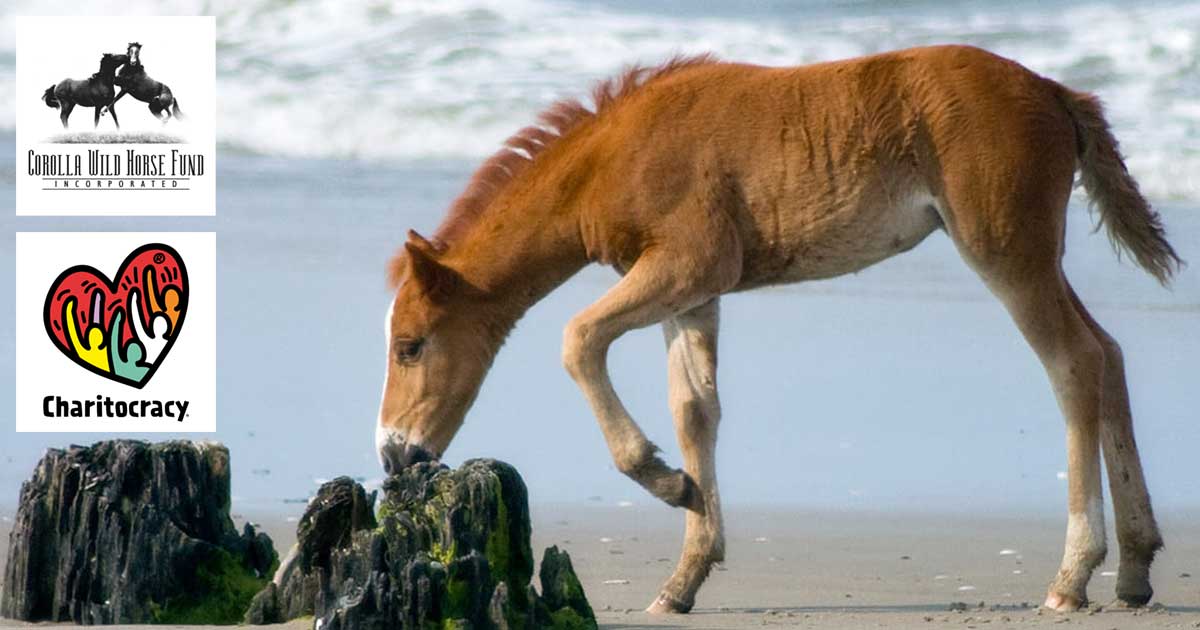
Next in our series of posts about new Charitocracy OBX nominees, we have nominee Corolla Wild Horse Fund, nominated by donor sherylwthorp. They protect, conserve, and responsibly manage the herd of wild Colonial Spanish Mustangs roaming freely on the northernmost Currituck Outer Banks, and promote the continued preservation of this land as a permanent sanctuary for horses designated as the State Horse and defined as a cultural treasure by the state of North Carolina. You can find their web site here.
A few words on Charitocracy
Firstly, for newcomers: here's how it works. Donors pool their monthly contributions, as little as $1. The cause with the most votes each month wins the pot. No matter how much or how little you contribute, each donor at Charitocracy gets one vote. This is where charity meets democracy. So please share this post (see social sharing icons at top of post) and ask your friends to join us and vote! That's how we spread the word and, as a result, grow the monthly pot. The bigger the pot, the bigger our positive impact on the world!
About nominee Corolla Wild Horse Fund
THE MISSION
Our mission is “to protect, conserve, and responsibly manage the herd of wild Colonial Spanish Mustangs roaming freely on the northernmost Currituck Outer Banks, and to promote the continued preservation of this land as a permanent sanctuary for horses designated as the State Horse and defined as a cultural treasure by the state of North Carolina.” The Fund incorporated as a 501 (c) 3 nonprofit charity in 2001.
WHAT MOTIVATED THE GROUP TO FORM?
Between 1985 and 1996, twenty horses were killed by vehicles on the stretch of road between Duck and Corolla, and a group of citizen-volunteers came together to change this tragic, destructive pattern. Many of today’s visitors to the Outer Banks do not know that before 1985, the 17 mile stretch of road between Duck and Corolla remained unpaved and infrequently traveled. Paving that road opened the floodgates for development, tourism, and more and more contact between wild horses and humans – and their vehicles.
“THE SANCTUARY” AND THE SOUND-TO-SEA FENCE
The early founders of CWHF researched and attempted several strategies to stop horse fatalities caused by traffic on Highway 12 between Duck and Corolla. In the end, the most effective solution, even though controversial, was to move the remaining twenty horses north of the paved road – to the “north beach” or “4×4 area.” (No one knows for certain how many wild horses were already in the roadless area north of Corolla.) By 1997, CWHF completed the southern sea-to-sound fence of the sanctuary, and the wild horses were relocated to the new “sanctuary”. The northern fence is eleven miles north, at the Virginia state line. Unfortunately for the horses, development continues to push north. Although referenced as a wild horse “sanctuary”, the 7,544 acres accessible to the horses is a mix of 1/3 public land and 2/3 private land. There are 3,150 platted lots with only 21% of the northern beaches currently developed. The beach is considered public road, and it is open to the public. It is the only access for residents of Corova, the growing community on the north end. Purchase the DVD, “Wild in Corolla,” to learn more about the formation of the Fund and its effort to relocate the horses. The film is narrated by Charles Kuralt.
So check out this primer about the wild horses, then please visit the page of Corolla Wild Horse Fund to vote for, like, or discuss this cause!

